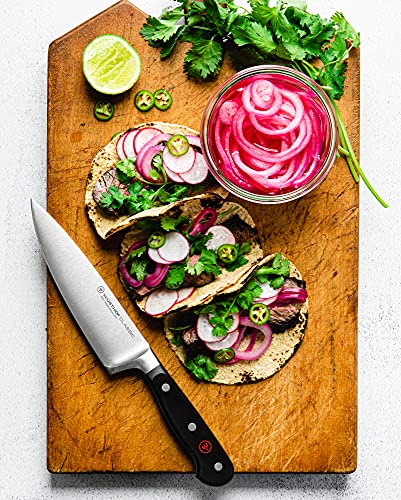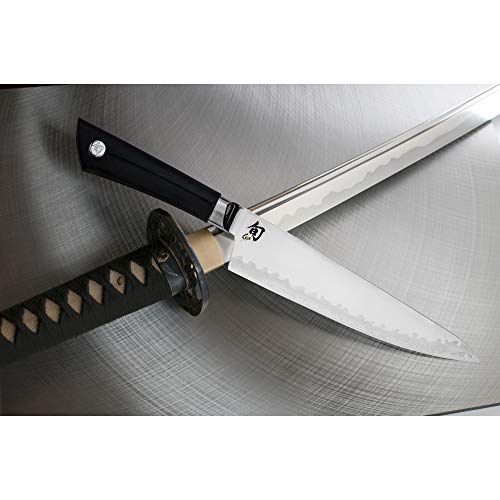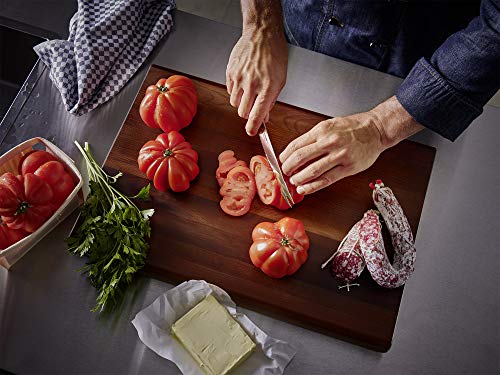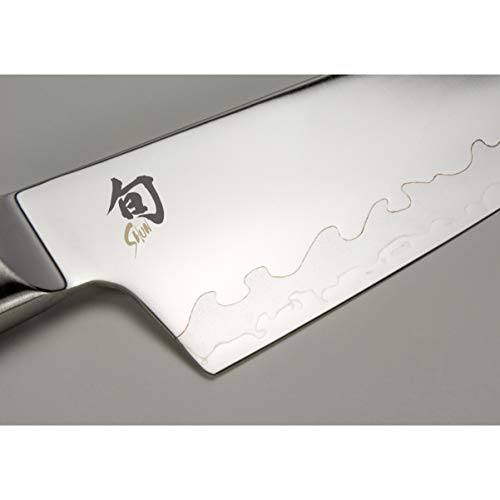The best of the East meets the best of the West in this Shun vs Wusthof knives review. These brands have been top of the game in the knives business for over a century. Each has shown proven its worth through its top-quality crafting methods.
In this article, you’ll find out all the details, big and small, about Shun and Wusthof knives. By the end, you’ll be able to pick the best brand for yourself and your loved ones.
What is Shun?
Shun is a Japanese manufacturer of high-quality kitchen knives that was established over a century ago in 1908. They craft their knives in Seki City, Japan’s central hub of blade craftsmanship (1).
Shun has since expanded to a globally reputable company with 11 knife collections. They make their blades with Japanese high-carbon stainless steel.
Shun knives‘ best feature is their traditional blade and handle designs. These evoke the skill and practice of an older era of expert craftsmanship.
In addition, their vintage style designs accent the knives in such a way that brings a sense of Edo-Japan with its samurai-like appearance.
Aesthetics aside, Shun’s blades are typically made through a 100-step crafting process that results in a highly refined blade. As a result, these blades have long-lasting edge retention resistant to rust and corrosion.
What is Wusthof?
Steeped in tradition and dating back to an early origin, Wusthof was established more than 200 years ago. They have become one of the most elite knife brands in the world.
Founded in 1814 in Solingen, the ‘city of blades,’ Wusthof has since grown into a high-quality manufacturer of premium-class kitchen knives. They are unmatched in delivering the Michelin-star experience.
In fact, Michelin-star chefs worldwide use Wusthof knives, including Gordon Ramsay, who attests to their high-performance and lasting results.
Wusthof forges its blades using high-quality, high carbon steel in a 40-step process perfected over decades. This results in highly durable knives with an extremely sharp edge that resists damage to rust and corrosion.
Wusthof also offers a stamped knife collection, making their products a little more affordable for those on a tighter budget. This is because their forged knives are not cheap by any means.
How they are made
Shun makes their knives using a 100-step process incorporating the combined efforts of the highly skilled artisans of Seki city. These bladesmiths know the traditions and skills of ancient Japanese swordsmiths who once inhabited the area.
Shun uses various special materials in their blades, known as “super steels,” namely VG10, VG-MAX, SG2, and high carbon stainless steel.
The master artisans expose these special steels to extreme temperatures to mold and reshape them into the desired form. They make their blades using full tang construction, running through the handle as a single entity, minimizing the risk of snapping under pressure.
Many of Shun’s products, such as the Shun Classic knives collection, are made in a Damascus style. These incorporate beautiful patterns which are etched onto the blade’s surface upon completion.
Wusthof makes their knives using the forging process, but incorporates a shorter process of 40-steps to manufacture their products. However, Wusthof crafts its knives in a more technologically advanced manner than the more traditional Shun. They use robotics combined with human skills for precision-forged knives.
Wusthof often makes its handles with synthetic materials such as Polyoxymethylene which provides a durable and secure grip with its rubbery texture (2).
Made with cutting-edge full composite tang construction, Wusthof crafts its blades with a high chromium content that resists rust and corrosion. This means they can withstand exposure to moisture better than most knives. So long as the handle material is appropriate, it is typically safe for cleaning via dishwasher.
While most Wusthof knives are made using the forging process similar to Shun, they also offer one line of affordable stamped knives in their Gourmet collection.
Blade differences
One of the advantages of Shun knives is that they feature superior sharpness of 16-degree angles per side, sharper than the average blade. This is a core design principle of Japanese knives, coupled with a Rockwell Hardness score of 61. But, unfortunately, they are also one of the hardest blades on the market.
This combination of sharpness and hardness helps keep Shun blades durable and long-lasting. They also come with solid edge retention that beats most knife brands today.
Shun makes its knives using the forging process, meaning they are more durable, stronger, and longer lasting than most knives. However, unlike Wusthof, Shun does not offer a stamped collection, so you can’t go for an affordable knife option like you can with the German brand.
Shun knives are very sharp, but not quite as sharp as Wusthof. However, they offer a greater range of advanced stainless steel, such as the VG MAX cutting core, stainless Damascus cladding, and blue carbon steel.
Most of Wusthof’s products are built with full tang construction and usually consist of forged blades that are super sharp and highly durable. Wusthof sharpens its blades to 14-degrees per side for a razor-sharp edge that can pierce through anything.
While this usually puts knives at greater risk of chipping, Wusthof accounts for this by backing itself up with high-carbon stainless steel. They also add alloys and elements that heighten its strength, durability, and edge retention levels for longer-lasting results.
When it comes to performance, Wusthof are hard to beat. Their perfected process of crafting harnessed over 200 years gives them a slight edge over Shun. In addition, few brands can boast an extra sharp blade of 14-degree angles per side and still be strong enough to resist chipping and cracking.
The 58 HRC score of Wusthof knives is less than Shun’s 61 score. However, this allows the German knives extra room for error when cutting tough ingredients. In addition, the blade can bend and warp slightly and be even more resistant to cracks.
Material differences (blade and handle)
The typical Shun knife features a beautiful patterned blade design with a unique Pakkawood handle that radiates tradition and comfort. In addition, they typically make their handles with a rounded shape.
This shape provides a unique ergonomic feel that removes the pressure of curved tips pressing into your hand. Shun handles also come in synthetic material options, giving the user a wide array of design choices.
In terms of the blade, Shun knife lines have a greater range of steel materials used in their blade’s construction. Although, they are all forged and built-in full tang accordingly. These steels include VG-10, VG-MAX, SG2, and high-carbon Blue steel, all of which provide excellence in various areas.
Depending on the blade you go for, you could emphasize sharpness and cutting performance, or you can go for durability and edge retention.
While the Japanese-style knife is usually made sharper than the average German knife, this is not the case with Wusthof. Instead, this top-tier brand of German knives stands out from the rest by offering exceptional levels of cutting-edge performance, incredible durability, and edge retention.
They achieve this by using premium German steel known as x50crmov15, one of the highest quality steel materials that exist in the region.
This incredibly high-performing material makes Wusthof highly durable and long-lasting. This, despite a Rockwell Hardness score of just 58 (compared to Shun’s 61). A lower hardness score usually means less edge retention, but Wusthof retains its edge longer than most knives.
Furthermore, Wusthof offers the best of both worlds by having blades that won’t chip or crack for being too hard. They also won’t lose their edge for being too sharp, resulting in a perfectly balanced knife.
Warranty
Shun and Wusthof knives have a limited lifetime warranty when purchasing their products. This means you can have your knives returned and replaced at little to no charge.
However, remember that these warranties only cover you for manufacturing, craftsmanship, or material quality defects. They will not cover you for your own misconduct resulting in damaged products.
Unfortunately, neither of these brands provides sharpening services like other knife brands such as Cutco. On the plus side, both Wusthof and Shun knives offer a range of sharpening tools in their collections. These include honing steel rods and blade sharpening rocks.
This means you can easily maintain the edge of your knives with little time wastage having to send your knives to the manufacturer and back.
Cleaning
As with most high-quality kitchen knives, manufacturers always recommend hand washing over dishwasher use. This is because dishwashers expose the blades and handles to excessive water, which could compromise their condition. Ultimately, this means you end up with a rusted or corroded product before long with diminished performance.
However, you should keep a few things in mind if you use the dishwasher. First, Shun and Wusthof both make their knives with highly durable blades with high chromium content. This means they are both relatively dishwasher safe as far as the blades go. However, the handles may pose another issue.
With that said, you should avoid placing any knife in the dishwasher with a fragile handle material that won’t react well to excess moisture. In this instance, a standard “no-no” is Pakkawood handles, which are common in the Shun knife lines. Synthetic handles are more dishwasher safe in that regard.
Still, for the safest results, you should go with those with an innovative steel handle design. These brands have enough corrosion-resistant alloys to bypass risks of damage.
In essence, you’ll have a much better time handwashing your knives. This will save you the trouble of finding compatible knives for your dishwasher and help you avoid issues that may persist anyway.
Of course, dealing with kitchen knives is always dangerous to some extent. Just as you strive for safety when using them to prepare ingredients, you should strive to take the same care when handwashing.
The companies recommend you use durable latex gloves when handwashing your blades. Apply warm water to wash off any food residues from your knife, and apply a light soap or detergent as preferred.
Use a sponge or a damp cloth to wipe down the blade and handle. Take extra precautions to avoid harming your fingers or cleaning tools. Leave it out, or use a separate cloth to dry your knives for immediate use. Store them in a safe place, such as a drawer or knife block.
How are they different?
Wusthof and Shun differ significantly from where they originated and their unique practices in crafting their knives. Wusthof was established over 200 years ago in Germany, while Shun was established over 100 years ago in Japan. As you would expect, Wusthof predominantly crafts German knives, whereas Shun crafts Japanese knives.
In terms of sharpness, Wusthof sharpens its knives to about 14 degrees per side for an extremely steep angle. Despite being a Japanese brand of knives, Shun knives are not quite as sharp as Wusthof, coming in at 16-degree angles per side.
These two brands of knives also differ significantly in hardness scores. The German brand received a 58 HRC on their chef’s knife, while the Japanese brand got scores of 61 HRC.
Perhaps most notable is the difference in blade materials between the Shun knife and the Wusthof knife. Shun uses a combined stainless steel alloy range that includes various super steels such as VG10, VG-MAX, and SG2, each of which excels in different areas.
Wusthof knife lines typically come in the same material, x50crmov15 German steel, widely regarded as the highest quality of stainless steel in the nation.
Both brands use the forged process when crafting their blades, but their manufacturing process differs significantly. Shun knives are steeped in tradition, using a purely human crafting process comprising 100-steps that take on the practices of ancient Japanese swordsmiths.
Wusthof makes its blades using a shorter 40-step process that cuts much of the physical labor. They combine the skilled artisans’ efforts with robotic technology’s prowess.
How are they similar?
The most apparent similarity between Wusthof and Shun knives is that they both construct forged knives as their primary product offering. This means they both offer a sharper edge made of harder steel that is significantly more durable than other knives.
In addition, both brands use the crafting process incorporating laser-cut steel molded and reshaped through exposure to extreme temperatures.
Wusthof typically goes for the synthetic handle material and Shun uses vintage Pakkawood. However, they both offer knives and knife sets in either handle material. A classic kitchen knife set from either brand will usually feature a chef’s knife, paring knife, utility knife, and knife block made of recycled wood fibers.
Shun and Wusthof knife sets also have regular sharpening tools such as steel honing rods and sharpening rocks. These allow you to maintain the sharp angles of your knives for longer periods.
As both knife brands forge their knives, this tends to lead to higher price ranges that are not quite as affordable as other kitchen knife brands. But, of course, it is normal to pay a little extra for high-quality products. Particularly when considering the higher cost of supply and manufacturing of premium materials and intricate crafting processes.
While Wusthof does offer a more affordable line of stamped blades in their Gourmet collection, all other Wusthof lines are forged. As such, just as pricey as Shun, entering that elite top bracket price range.
What’s better about Shun?
Beauty and aesthetics are where Shun outclasses most other knife brands, as their blade designs and traditional Japanese knife handles are iconic and appealing to the eye. But, more than just a high-quality brand of knives, Shun makes intense chopping sessions quite enjoyable. The feeling you get from using them makes you never want to order takeout again.
Shun is the first Japanese knife line that has gone the extra mile to bring traditional samurai-style craftsmanship into the modern culinary industry.
Shun knives are also significantly harder than Wusthof knives, reaching levels of Rockwell Hardness scores of 61 HRC compared to Wusthof’s 58 HRC. This means the blade is stronger and more likely to last a lifetime of use while providing the extra kick needed to pierce through tough ingredients.
Shun knives are also available in a broader range of steels, each providing unique benefits that can more accurately tailor to customer needs. This makes it a more versatile brand than Wusthof in that respect.
What’s better about Wusthof?
Wusthof Classic knives are all made with x50crmov15 German high carbon stainless steel. They boast a combination of critical elements in a composite tang construction. This means the blade’s molecules are organized in such a way as to give the edge a more robust interior while encompassing thicker blades.
The benefit of Wusthof kitchen knives is that you get the durability of premium materials and the sharpness of 14-degree blade angles. In addition, it can bend when needed through its balanced HRC score of 58.
Unlike most knife manufacturers, Wusthof makes their knives through the combined efforts of man and machine, humans and programs. The result is an intricate process that combines the fine touch of a highly skilled craftsman with the precision, intelligence, and strength of computer robotics and machinery.
Furthermore, Wusthof offers a line of stamped knives in their Gourmet collection, providing more affordable options for customers to choose from.
Who should get Shun and why?
Shun knives would greatly suit lovers of Japanese culture and tradition. The design of their blades brings with it a legacy dating back to samurai swordsmithing practices. In addition, their choices of beautifully rounded handles made of authentic wooden materials make them both pleasant to use and to gaze at.
A fine example is the Shun classic line which hosts the Shun Kai Group knives. It has a dark wooden handle and a gorgeous patterned blade for the ultimate cutting experience.
Other things you’ll love about Shun include their range of super steels that differ based on the collection you go for. For example, some of their knives are made of VG10 steel, which emphasizes rust resistance, whereas others are made of SG2, which specializes in edge retention.
Furthermore, Shun knives have a greater variety of product offerings. For example, they have 11 collections of forged knives compared to Wusthof’s 7 collections, making Shun suitable for those seeking a greater variety of knives.
Who should get Wusthof and why?
Wusthof’s cutting performance is simply unmatched. If you are mainly concerned about getting the best possible blades that can pierce through any ingredient, then you should consider the German giant. These knives are used by Michelin-star chefs worldwide and feature on top TV programs such as Hell’s Kitchen and Kitchen Nightmares.
If the testimonies of world-class chefs could sway your decision, then you should know that Gordon Ramsay is a massive advocate for Wusthof’s German blades.
Finding the right knife can be tricky (and expensive), but Wusthof makes things easy for you by giving you affordable options through their stamped Gourmet collection.
Buying knives of the highest quality does not need to be super pricey. With Wusthof’s stamped collection, you can still enjoy the power of x50crmov15 German steel, though they won’t be as strong as the forged collection.
This means Wusthof appeals to people who seek bargains and those who seek the best-performing knives in the world.
Features
Blade
Wusthof are the masters of German knives, boasting x50crmov15 high carbon stainless steel that delivers durability and strength. In addition, their blades are sharpened to ultra-sharp angles of 14 degrees per side and come at a well-balanced hardness score of 58 HRC. This makes Wusthof knives thicker, more durable, and sharper than Shun.
Shun knives are made with 16-degree angles per side and typically come at a hardness score of 61 HRC, making them harder than Wusthof. They also use a greater range of steels, including VG-MAX and SG2, specializing in different areas.
While they do well to contend with Wusthof in materials and craftsmanship. Wusthof has a slight edge in delivering a higher quality material and a more intricate crafting process combining human and robotic efforts.
Winner: Wusthof
Handle
Shun knives have one of the most gorgeous and aesthetic handle designs you’ll find on the market today. Their traditional designs offer a beautiful aesthetic that captures the essence of the Japanese swordsmith. Moreover, it holds a prowess that has stood the test of time since the days of the samurai.
The classic Shun knife will usually feature a type of wooden material they design with a rounded bottom for a more traditional look.
Shun also offers some synthetic handles, but Wusthof have a greater range in this regard. Wusthof designs its handles for practicality and modernity, with triple rivets and a rubbery texture that encourages grip and control during the cutting process.
While the German brand offers aesthetically stunning handles, such as the rounded tip of the Wusthof Ikon, Shun takes the cake. In addition, they offer a greater variety of more impressive-looking knives.
Winner: Shun
Price and Warranty
Both knife brands are priced a fair amount higher than the typical kitchen knife brand. You’ll find a similar pricing format between Shun and Wusthof products.
Furthermore, both brands have a similarly limited lifetime warranty. They cover you for any defects relating to the quality of the material of craftsmanship so you can have your knives replaced or repaired at little to no cost.
On all fronts, Wusthof gives itself an edge by offering stamped knives unavailable with Shun. As a result, they offer a cheaper alternative for customers, ultimately making them a more appealing brand for a wider audience.
Winner: Wusthof
Shun vs Wusthof FAQ
Is Shun or Wusthof better?
Both brands excel in different ways, with Shun being the better-looking brand while Wusthof is the higher-performing one. With that said, both brands perform well and look great, so you can’t go wrong with either of them.
What knife is better than Shun?
If you are looking for a sharper edge, you will find Wusthof knives to be better than Shun. Knives in the Wusthof Classic line are made with 14-degree angles per side of the blade’s edge, making them significantly sharper than Shun’s 16-degree blades.
Is Shun worth the price?
Shun is undoubtedly worth the price for the right customer, but not if the customer is happy to settle for a lower-quality knife that can achieve most of their desired tasks. Due to an intricate and complex knife manufacturing process and superior materials, Shun knives are priced higher than most brands. Still, they are worth the quality and performance you get with them.
Sources
(1) – https://visitseki.jp/
(2) – https://www.sciencedirect.com/topics/engineering/polyoxymethylene


















